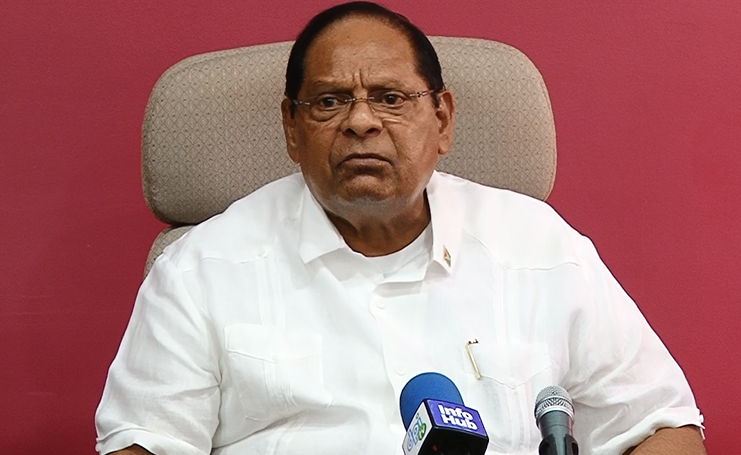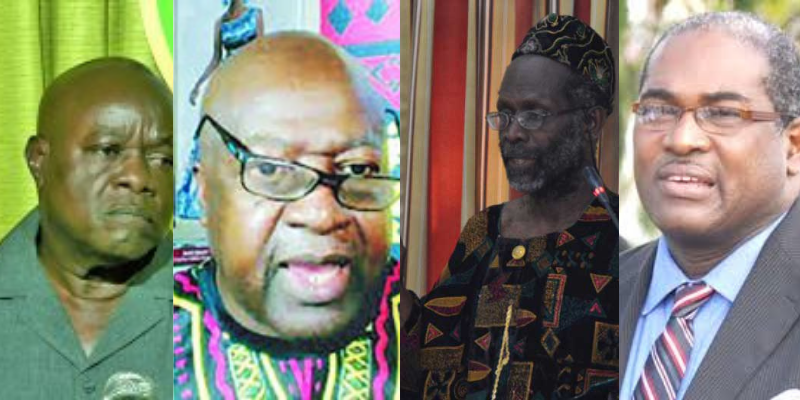The political leaders who identify as African representatives in Guyana must face a demographic reality: they constitute only 29.1% of Guyana’s population, while Indo-Guyanese make up the largest ethnic group at approximately 39.8%. The remainder of the population includes 19% mixed race (mainly from Indo-Guyanese marrying and partnering with Amerindians, Chinese, Portuguese, and some Afro-Guyanese), 10% Amerindian, and about 1% of Portuguese and Chinese descent. Given these figures, it is both mathematically and politically clear that the Afro-Guyanese opposition group cannot realistically win a national election without the Indo–Guyanese whom they label as racists.
These African leaders in Guyana labelled 71% of the population, including the Indo-Guyanese, as racists. They must realize that Guyana is in South America and that 71% of its citizens are not of African origin. The sooner they understand this, the better it will be for the African community they are meant to represent.
Thousands of democracy-loving Afro-Guyanese voters are abandoning these African leaders’ groups and flocking to the PPP party in large numbers.
The race card policy is the only option these African leaders in Guyana are offering to Afro-Guyanese voters.
This is precisely why Forbes Burnham, founder of the People’s National Congress (PNC), repeatedly resorted to election rigging to remain in power—he understood that free and fair elections, based on population strength, would favour the Indo-Guyanese majority. Today, rather than moving past that legacy, many opposition voices continue to use racially divisive rhetoric to distract from their electoral weaknesses, accusing Indo-Guyanese of racism while employing the very same tactics themselves.
Many Afro-Guyanese voters are increasingly disillusioned with so-called African leaders like Aubrey Norton, Nigel Hughes, David Hinds, and Tacuma Ogunseye, who have failed to represent their interests genuinely. These leaders appear more focused on perpetuating race-based politics than on providing real solutions to the challenges facing their communities. Instead of building inclusive platforms, they continue to promote the false hope that a government can be formed based on a minority population, ignoring the demographic reality that Afro-Guyanese represent only 29.1% of the country. This outdated and divisive approach has led to growing frustration among Afro-Guyanese citizens, many of whom are now joining the PPP party not out of belief, but out of desperation, misled by empty promises and manipulated by African leaders who exploit ethnicity for political survival.
Those who speak disparagingly about Moses Nagamootoo must also understand the full context of his political journey. Nagamootoo is of South Indian descent, specifically Tamil (often referred to locally as Madrasi). He never positioned himself as a representative of Indo-Guyanese culture or interests, frequently distancing himself from his ethnic identity to appeal to broader coalitions. Nagamootoo declined to acknowledge his South Indian culture. However, it is precisely this disconnection that allowed political manipulators to use his presence to create the illusion of ethnic diversity while sidelining genuine Indo-Guyanese voices. His case is not one of principled cross-racial alliance but rather a cautionary tale of tokenism. His legacy is remembered not for empowering his community but for allowing himself to be politically exploited—someone who never truly represented the interests or cultural identity of the Indo-Guyanese people.
Concerns persist about the motives behind the opposition’s effort to project an image of multiracial unity, particularly in light of inflammatory remarks made by Working People’s Alliance (WPA) Co-Leader, David Hinds. His recent comments on his show, Politics 101, have sparked widespread condemnation due to their racially charged tone and attempts to reduce Indo-Guyanese to political pawns.

Regarding crossovers, Hinds stated that Indo-Guyanese followed former Prime Minister Moses Nagamootoo into the Alliance for Change (AFC), believing “they were going into a smaller India party.” He further claimed that “Nagamootoo come halfway,” suggesting that Indo-Guyanese support is based solely on ethnic identification. These comments are not only divisive but also insult the intelligence and agency of a demographic that constitutes approximately 40% of Guyana’s population, making Indo-Guyanese the single largest ethnic group in the country.
Hinds’ commentary didn’t stop there. He doubled down with his characteristic vitriol, calling Region 4 Chairman Daniel Seeram a product of “ethnic window-dressing,” asserting, “Because he’s Indian – nothing else! He didn’t have a political track record.” This baseless attack ignores Seeram’s professional accomplishments and serves no purpose other than to belittle individuals based on their ethnicity. In another disgraceful instance, Hinds referred to former PNCR General Secretary Geeta Chandan-Edmond as a “slave catcher”—language that reeks of racism and disrespect.

Worse still, these comments were made in the presence of other opposition-aligned figures such as Tacuma Ogunseye, Vincent Adams, Wayne Caesar, and Nigel Eliakim, none of whom objected. This silence amounts to endorsement by omission. The leadership of the APNU, particularly Aubrey Norton, has failed to condemn these divisive statements. When questioned by the press, Norton unapologetically stated, “…There’s no way we will condemn David,” instead calling him “passionate” and “intelligent.” Such irresponsible leadership erodes public trust and weakens the country’s democratic fabric.
On his political show Politics 101, Hinds shamelessly declared that those who followed former Prime Minister Moses Nagamootoo into the Alliance for Change (AFC) did so because they thought they were entering a “smaller India party.” This statement is not only offensive; it is also reductive, ignorant, and steeped in racial prejudice. Indo-Guyanese citizens are fully capable of independent thought and political agency. To suggest otherwise implies that their decisions are based solely on ethnic loyalty, rather than values, policies, or national interest.
Indo-Guyanese comprise nearly 40% of the population, making them the largest ethnic group in Guyana. This community has played a vital role in shaping the country’s economy, agriculture, education system, and public service infrastructure. Their contributions are significant and span generations. Reducing their presence in politics to a cynical tool of “ethnic appeal” is a disgraceful insult to their legacy and civic engagement.
Even more concerning is that Hinds was not alone in this charade. His fellow Africans—Tacuma Ogunseye, Vincent Adams, Wayne Caesar, and Nigel Eliakim—offered no resistance or correction. Their silence was deafening. When a public figure makes derogatory racial comments and those around him fail to challenge them, the implication is clear: they either agree or lack the courage to disagree. Either option is unacceptable.
This pattern of racial provocation is not new for David Hinds. From calling PNCR’s Geeta Chandan-Edmond a “slave catcher” to claiming Daniel Seeram only became Region 4 Chairman due to “ethnic window-dressing,” Hinds has built a career on stoking the flames of racial resentment. Yet, instead of distancing the APNU from this dangerous rhetoric, its leader, Aubrey Norton, has embraced it. When pressed to respond, Norton refused to condemn Hinds, calling him “intelligent” and “passionate.” This is not leadership; it is cowardice disguised as loyalty.
The opposition’s ongoing reliance on figures like Hinds, whose brand of politics is rooted in division and race-baiting, demonstrates that their claims of multi-ethnic unity are hollow. Their strategy seems clear: to use token Indo-Guyanese representatives for electoral appeal while allowing the narrative to be dominated by Afro-centric voices with anti-Indian bias. This is not unity, it is exploitation.
Furthermore, Hinds’ dismissive comments about Indo-Guyanese reflect a dangerous mindset that seeks to delegitimize their democratic participation. It implies that Indo-Guyanese only belong in politics if they serve as puppets, and any act of independence or support for another party is viewed as an act of betrayal. This mentality is toxic and must be rejected by all Guyanese who believe in true unity and progress.
Let us be clear: Guyana does not belong to any particular race. The Indo-Guyanese are essential to the nation’s progress because of their numbers, history, and contributions. It is unacceptable to reduce their political decisions to mere tribal loyalty or “ethnic window-dressing.” Such rhetoric disrespects decades of struggle, education, and sacrifice made by Indo-Guyanese families for a better Guyana.
If the opposition wants to be taken seriously by the Guyanese electorate, it must root out those who spew racial toxicity. Guyana deserves leaders who rise above race-baiting and work for national unity, not those who try to divide and conquer by manipulating ethnicity for political gain.
Indo-Guyanese voters and Guyanese from all backgrounds must not be misled by the opposition’s superficial diversity. True unity arises from mutual respect, active listening, and the equal valuation of every citizen. If the opposition fails to embody this, they do not deserve the trust or the votes of a nation tired of ethnic manipulation.
It’s time to call these racist tactics what they truly are: desperate, divisive, and harmful to our national future and the well-being of all Guyanese communities that seek to live in peace and harmony with their fellow Guyanese.





